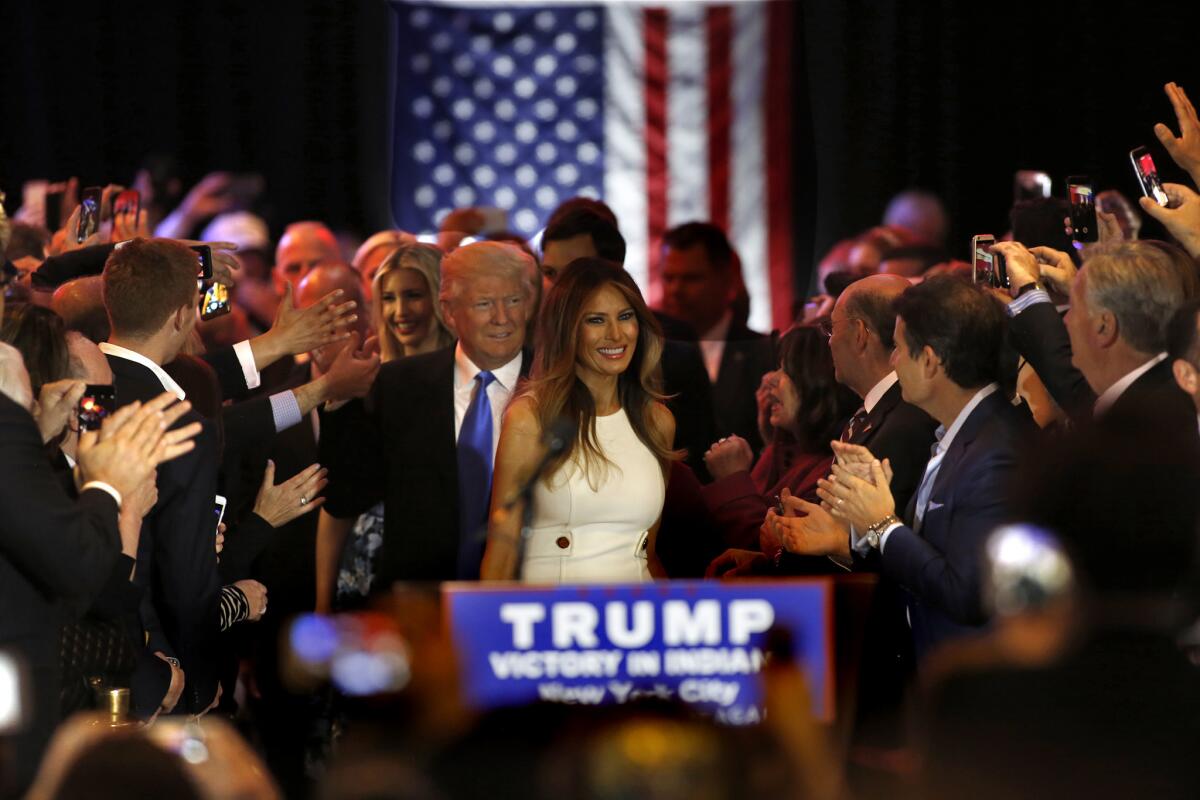Capitol Journal: How did Trump become the presumptive nominee? Blame Twitter

Melania and Donald Trump greet supporters and the media after his victory in the Indiana primary.
- Share via
In Sacramento — So California’s Republican presidential primary will be a dud after all. Fantasizing about playing kingmaker — or crown denier — was fun for a while. But reality reared its head in Indiana.
How an insulting, ill-mannered, public policy ignoramus could be chosen by voters to be the presidential nominee of a major party will be pondered for years, probably decades.
Sure, there’s an anti-establishment, anti-government, anti-politician, even anti-party revolt festering. Many voters feel left out economically. Many think they’re oppressed by a powerful, detached government. Many resent being spun and used by the political system. Many are angry at political paralysis.
But why Donald Trump — someone who’d be sent to bed without supper, with soap in his mouth, if he were a kid in an earlier generation?
There are many answers. Start with this: Trump’s competition was hardly compelling. Never mind Ted Cruz’s philosophy. His persona was intolerable.
But here are two root reasons for Trump’s unpredictable ascent to becoming the GOP standard bearer despite acting like a blowhard bully: 1. broadcast media. 2. social media.
First, the former.
Republican strategist Steve Schmidt — senior advisor for Sen. John McCain’s 2008 presidential bid and campaign manager for Gov. Arnold Schwarzenegger’s 2006 reelection — articulated it during an MSNBC postmortem Tuesday night: “The tone is disgusting” on much of talk radio and some cable TV.
“This cancer has spread and the tone has infested the whole Republican Party,” Schmidt said. It has been echoing for years, he continued, and “you arrive at this moment.”
I asked another longtime GOP strategist, Rob Stutzman of Sacramento, why voters were willing to swallow candidate incivility, including previously forbidden name-calling, such as “Lyin’ Ted.” And only Tuesday, Trump regurgitated an unsubstantiated tabloid report linking Cruz’s father to President Kennedy’s assassin.
“That has manifested itself on radio and TV now for 25 years and it matters,” said Stutzman, who had been leading a stop-Trump effort in California. “Over a third of Republican voters want to empty the gas can and light a match.”
In short, they hear rudeness and reckless talk in the broadcast media and gradually it becomes acceptable in the exercise of democracy.
Now for social media.
It nurtures short attention spans, the craving for instant gratification and impersonal barbaric behavior. No time for serious thinking or boning up on substance. A quick stimulating hit of social recognition will suffice. And no need for civility when you’re not looking someone in the eye.
I called an expert on social media, Jim Steyer, founder and CEO of Common Sense, a San Francisco-based nonpartisan, nonprofit organization that lobbies for and studies kids. He’s the brother of billionaire environmental activist Tom Steyer.
Common Sense published a lengthy report this week on “technology addiction.” It found that 50% of teens “feel addicted” to mobile devices and 59% of parents agree that their kids, indeed, are addicted.
“Our digital lifestyles, which include frequent multitasking, may be harming our abilities to remain focused,” the report said.
“They can’t put [a smartphone] down,” Steyer told me. What’s the harm? “A lack of empathy, lack of quality human relationships, an inability to pay attention.”
I asked Steyer whether this had anything to do with voter behavior.
“It’s transforming all aspects of human behavior, including the political side,” he said. “Trump understands reality TV. This election is a reality TV show.”
Trump is addicted to tweeting. There’s no disputing that.
“The world of instantaneous thinking lends itself to less thinking,” Steyer said. “People want lots of bits of information, but don’t necessarily synchronize it into a coherent fold. In a world where everyone is addicted to cellphones, there’s less reflection.
“That provides the ability for people like Donald Trump to bully everyone on Twitter. It’s pretty troubling…. The real story of this election is it’s going to get the hall of shame award. But the candidates aren’t shamed anymore.”
That’s because so many voters no longer consider obnoxious behavior shameful.
And not enough are willing to demand more than a simple pledge to “make America great again.”
Trump does have a potent argument — even if it lacks specificity — against trade agreements that encourage exporting American jobs. But one emailer had a good point: If voters are so fired up about that, why don’t they commit to buying only American-made products?
There are many reasons for the voter rebellion.
Congress is polarized politically. But it reflects the voters who elect the Congress. Voters are polarized by the broadcast media. Yet, they are angry that nothing gets done in Washington and blame the politicians.
People are really sick of political-speak, which comes from talking points honed by candidate polling and focus groups. It’s insulting to voters. And both parties are guilty.
Cruz was particularly pathetic Sunday on NBC’s “Meet the Press” when he stubbornly refused to answer, despite repeated questioning, whether he would support a Trump candidacy against Democrat Hillary Clinton.
Trump would be a national and party disaster, Cruz asserted. But he still couldn’t say whether Trump would be worthy of support in November.
“Bottom line is just say no,” former GOP national chairman Michael Steele later opined. “Just say no.”
It’s a changed political world. But not entirely.
In November, the presidential campaign again will be a dud in California. The state will remain solidly blue and emphatically reject Trump.
Follow @LATimesSkelton on Twitter
ALSO
Analysis: GOP voters wanted an outsider who would fix the economy, and Trump fit their bill
Republicans face a critical moment: Accept Trump as their nominee or go rogue
More to Read
Get the L.A. Times Politics newsletter
Deeply reported insights into legislation, politics and policy from Sacramento, Washington and beyond. In your inbox twice per week.
You may occasionally receive promotional content from the Los Angeles Times.











